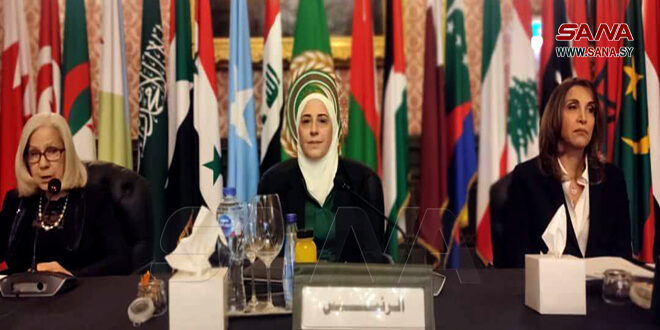Cairo, SANA- With the participation of Syria, the Arab Council for Population and Development held its sixth session in Cairo on Monday, with the participation of Ministers of Social Affairs and heads of delegations of the member states.
At the beginning of the session, the handover ceremony of the presidency of the sixth session of the Arab Council for Population and Development took place, where Minister of Social Affairs and Labor, Eng. Samar al-Sibai, head of the Syrian delegation representing the Syrian Arab Republic, assumed the presidency of the Council for the sixth session and for a period of one year.
In her opening speech, al-Sibai said that today’s meeting represents a rich opportunity to discuss the issue of “population dynamics,” which is a fundamental pillar of development in all its human and economic dimensions. In addition, it provides a broad scope for consultation and exchange of expertise with the aim of achieving further progress in labor standards.
Al-Sibai stressed that the ongoing barbaric Israeli aggression on Palestine and Lebanon, the Israeli repeated attacks on Syria, and the massacres, genocide, ethnic cleansing, and destruction of infrastructure committed by this Zionist entity exacerbate the health, social, and economic challenges facing Arab countries.
She pointed out that Syria received about 600 thousand arrivals from Lebanon during the last two months, where the Syrian government worked in cooperation with civil society to secure the necessities of life, relief, food, medical and health needs, accommodation services in hosting centers, in addition to providing the necessary psychological and social support to alleviate the humanitarian suffering of the arrivals.
Al-Sibai slammed the policies of usurping and plundering wealth and depriving peoples of it, and imposing unilateral coercive measures on many countries in the region.
She stressed that the population challenges and their dynamic interconnectedness with the economic, social and health variables facing the Arab region with its great diversity require unifying efforts and strengthening joint Arab action to address them.
Al-Sibai reviewed the efforts made in the population file in Syria through the Higher Population Committee headed by the Prime Minister and through the sub-committees in the provinces.
At the conclusion of its meetings, the Council adopted a set of decisions on several items related to the exchange of population data on expatriates, studying the challenges and causes related to the unequal population distribution between urban and rural areas, and enabling the elderly to participate effectively in society.
The Council also adopted the proposals submitted by the Syrian Arab Republic, which included preparing a policy study on the social, cultural and health determinants of women’s unmet needs in the field of family planning, and preparing a regional framework to enhance the role of youth in the transformative green economy.
Ruaa al-Jazaeri
 Syrian Arab News Agency S A N A
Syrian Arab News Agency S A N A

